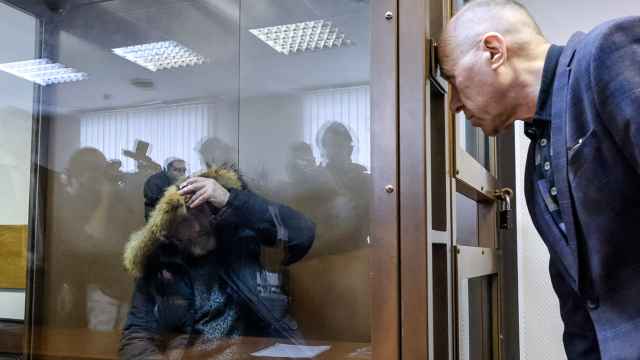Last Friday evening, the Russian Security Council met. In attendance were 12 men — almost all of whom are around 60 years old and who once worked in the KGB in St. Petersburg — and one woman. Many have speculated that they might have agreed on a plan to invade eastern and southern Ukraine after Putin revived the term "Novorossia," or New Russia.
None has significant economic insights. In the U.S., by contrast, the slightly larger National Security Council includes several economic officials, starting with the treasury secretary because the U.S. considers national security decisions economic issues as well.
Not surprisingly, the Kremlin seems oblivious to Russia's economic weakness. In his marathon television show last week, Putin said: "There are certain apprehensions [from the West] with regard to Russia itself — its huge territory, potential growth and power. This is why they prefer to cut us to size and take us to pieces."
But Russia has only a 2.9 percent share of global gross domestic product. This is only 6 percent of NATO's GDP. In 2012, Russia's defense expenditures corresponded to one-tenth of NATO's defense expenditures. A country so economically weak would be well advised not to challenge far wealthier and stronger neighbors. To make matters worse, Russia has few allies.
In particular, Russia is likely to be highly vulnerable to financial sanctions. One month ago, the Western discussion on possible sanctions against Russia focused on whether they could be effective. During the spring meeting of the International Monetary Fund in Washington April 12 to 13, the question was turned around: Do we really want to destroy Russia that fast? The dominant theme was that geopolitical risk is back, and Russia is seen as the main risk.
Official Russian reactions to the Western threat of sanctions have been that Russia's state corporations would invest in Russia and that Russia would establish its own payments system, making itself independent of the Western financial system. But none of this is realistic.
In its March report on the Russian economy, the World Bank showed that the country's total foreign debt at the end of January was $732 billion. The distribution between public and private debt is only available from October last year. Then, state banks had $128 billion and nonfinancial state corporations $164 billion of foreign debt. Adding $80 billion of government foreign debt, Russia's total public foreign debt was $372 billion, while its international currency reserves are $477 billion, but much of those can be frozen as well.
This makes Russia highly vulnerable to international financial sanctions. In an insightful article in Foreign Affairs magazine on April 10, Robert Kahn argued that "Russia's relationship to global financial markets — integrated, highly leveraged and opaque — creates vulnerability, which sanctions could exploit to produce a Russian 'Lehman moment': a sharp, rapid deleveraging with major consequences for Russia's ability to trade and invest."
That could mean a "sudden stop" of international finance to Russia, which would have devastating consequences for its economy. State banks and other state-controlled corporations are not creditors to the West but big borrowers. Companies such as Rosneft have larger debts than their market capitalization, and their debts are held abroad. If they are not able to roll over their large foreign debts, they will be starved of capital.
In recent weeks, the discussion in Washington has hardly been about whether to sanction Russian state banks but rather which ones and when is the best time to do it. Any significant bank that established itself in Crimea would be sanctioned. Gazprombank appears a prime target since its beneficiary owner, Bank Rossiya, is already sanctioned. In addition, it is relatively small and not that well connected with the rest of the financial system, so it could be used as a trial balloon.
Ukraine's Prosecutor General's Office has just initiated a criminal case against Sberbank, and probably will for other Russian state banks, for "financing terrorists," which is considered an extremely serious crime in the U.S.
Based on recent U.S. statements, it would be surprising if Washington does not sanction one or several Russian state banks this week.
Moreover, Kahn writes, "The West can mete out some degree of financial punishment without even explicitly sanctioning Russian banks." This can be accomplished by simply tightening rules governing due diligence and money-laundering activities. Usually, sanctions are only effective if European countries apply the sanctions as well, but given the dominant role of the U.S. in the regulation of global finance, little can be done without the approval of U.S. authorities. Recently, U.S. law enforcement fined British bank HSBC $1.2 billion for having laundered drug money in Mexico.
Putin's idea of a Russian payment system is a pipe dream. Who would accept Russian credit cards abroad? The big Russian state banks have already problems maintaining elementary correspondent relations because of their opacity. VTB Capital, for example, has complained about regulatory problems in London.
To judge by growth forecasts, JP Morgan and Finnish BOFIT assess that sheer market volatility in March alone shaved off 2 percentage points from Russia's expected economic growth this year. In the first quarter, Russia's GDP contracted by half a percent. In March, the World Bank presented a "high-risk" scenario in which Russia's GDP would decline by 1.8 percent in 2014, capital flight may reach $133 billion, and investment may fall by one-tenth. At present, that looks like a low-risk scenario.
The IMF and the Washington-based Institute of International Finance have recently produced much more pessimistic scenarios, which have not been published as yet. Both consider stress scenarios with a decline of Russia's GDP this year of about 4 percent, capital outflows in $150 billion to $180 billion and sharply falling exchange rates. Similarly, former Finance Minister Alexei Kudrin predicts a capital outflow of $160 billion this year. GDP could fall more because the risks are many, and they are nearly all on the downside.
The impact of the Kremlin's aggression against Ukraine on the Russian economy will be powerful and multifaceted. The country's international currency reserves will fall, but probably not below $350 billion. The ruble exchange rate will plunge, while inflation and interest rates will rise, reducing investment and consumption. The main positive effects will come from the cheaper ruble that will boost exports and improve the current account as well as the budget balance. The central problem will be falling standard of living, which is vital for Putin's power.
If Russia's National Security Council had invited one of the country's many good economists, it would probably have heard that Russia is in no shape to carry out an aggressive war in Ukraine.
Anders Åslund is a senior fellow at the Peterson Institute for International Economics in Washington.
A Message from The Moscow Times:
Dear readers,
We are facing unprecedented challenges. Russia's Prosecutor General's Office has designated The Moscow Times as an "undesirable" organization, criminalizing our work and putting our staff at risk of prosecution. This follows our earlier unjust labeling as a "foreign agent."
These actions are direct attempts to silence independent journalism in Russia. The authorities claim our work "discredits the decisions of the Russian leadership." We see things differently: we strive to provide accurate, unbiased reporting on Russia.
We, the journalists of The Moscow Times, refuse to be silenced. But to continue our work, we need your help.
Your support, no matter how small, makes a world of difference. If you can, please support us monthly starting from just $2. It's quick to set up, and every contribution makes a significant impact.
By supporting The Moscow Times, you're defending open, independent journalism in the face of repression. Thank you for standing with us.
Remind me later.






